Media coverage of Palestine mostly reports on the enduring conflict; however, as people there lead their lives, large amounts of waste are generated on a daily basis from homes, commercial establishments, construction sites, and other places of activity. When it comes to disposing of that waste, there are problems peculiar to conflict areas, and JICA has been tackling these problems together with skilled local experts. Article: Tatsuya Mitsuishi
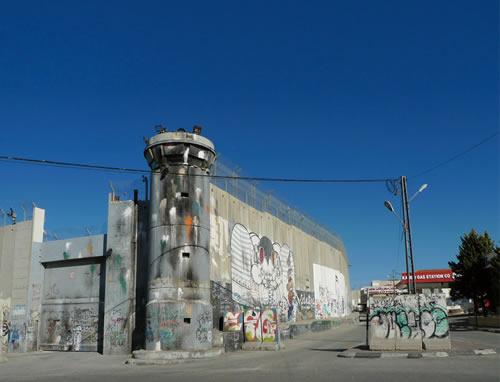
A wall constructed on the border between Israel and Palestinian territories
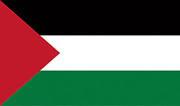
Palestinian Territories
Population: Approx. 4.95 million (as of 2017)
Official Language(s): Arabic
Project for Technical Assistance in Solid Waste Management
(January 2015 to July 2019)
This project has assisted 12 Joint Service Councils (JSC) established in the West Bank to ensure proper waste collection and transport. In addition to Local Expert Team (LET) forming and training of local staff, the project assisted in the formulation of the National Strategy for Solid Waste Management in the Palestinian Territory.
A major obstacle to waste collection and transport
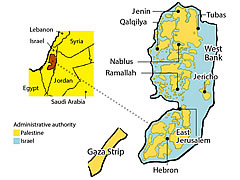
Detached residential areas make garbage collection and transportation difficult
(Source: Prepared based on data from the United Nations Office for the Coordination of Humanitarian Affairs (UN OCHA))
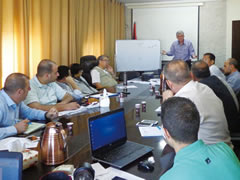
The Local Expert Team (LET) comprised of experts from leading JSCs where waste management is on track, such as the JSC in Jericho, which was supported in the Phase 1 project. Public awareness campaigns are also carried out for residents.
"The West Bank in Palestine is roughly the size of Chiba Prefecture of Japan (5,156㎢). However, where normally it would just take 10 minutes to get to the next town by car, sometimes it takes several hours because roads are blocked off, and it takes time to get through the checkpoints."
So explains Takaaki Murata of JICA, who is currently staying in Palestine and working for the project. The Oslo I Accord (1993) provided for the creation of the interim self-government body called the Palestinian Authority (PA); however, the neighboring country, Israel, is in charge of the regional security and administration of around 60% of the West Bank, so Israeli settlements are scattered about like islands near Palestinian residential areas. Palestinians are not allowed to go through these areas, and checkpoints manned by Israeli soldiers are set up in each area, which, as mentioned above, is one of the reasons movement is restricted.
Waste collection and transport is a major issue in Palestine. Although it is a conflict area, many Palestinians live there and, naturally, they generate waste daily. Currently, 430,000 tons of waste is generated in the Palestinian West Bank per year, which works out to 0.8 kilograms per person per day. Transporting the waste to disposal sites takes time and money because of the settlements and checkpoints. Securing new disposal sites is also difficult as it sometimes requires negotiations with Israel.
As a result, illegal open-air dumps called random dumpsites have popped up here and there. These random dumpsites generate foul odors and harbor pests that carry disease; they have caused problems such as contaminated groundwater and soil, worsening the living environment. International cooperation is being implemented to address these problems and carry out appropriate waste management.
JICA has been engaged in Phase 1 (2005-2010) and Phase 2 (2015-2019) of the technical cooperation, in addition to grant aid for the establishment of disposal sites and provision of equipment such as garbage collection vehicles and containers.
In Phase 1, we were able to launch waste collection and transport services through the Joint Service Council (JSC) in Jericho within the West Bank. JSCs are organizations that conduct waste management over wide areas, among municipalities forming associations to perform the work that had been done individually on a smaller scale. This allows more efficient utilization of personnel, vehicles, and funds. Twelve JSCs have been established based on the model of the JSC in Jericho and other trial areas, with every governorate in the West Bank having one JSC. The Ministry of Local Government (MoLG) now has an office that manages all JSCs. As for the facilities, two sanitary landfills were constructed with financial assistance from the World Bank—one in Jenin in the north, and one in Bethlehem in the south. However, some JSCs are lacking in organizational structure and capabilities for proper collection and transport of waste; in order to make improvements in that area, Phase 2 of the JICA technical cooperation project was launched in 2015.
"MoLG's JSC Office is the overseeing body for the JSCs, but when it was established, it consisted of only two officers: a director and a deputy director. The project could not proceed in such a state, so MoLG increased the number of staff members by three, but these new members were not necessarily familiar with solid waste management. To address this problem, four experienced, incumbent executive directors of other JSCs that had made good progress were added to the project team as the Local Expert Team (LET) for providing technical advice.
The role of the LET is to assist the office, provide technical advice to each JSC, evaluate the guidelines and other materials prepared through the project, and establish a sustainable technical support structure among Palestinians even after external support ends. Utilizing local experts was a novel approach for JICA's waste management projects, but it's very meaningful for us to train outstanding human resources that can work on waste issues in a sustainable manner."
With the project, we worked on increasing the number of office staff and training them, while pouring efforts into public awareness, such as having a local company produce a television program about improving waste collection.
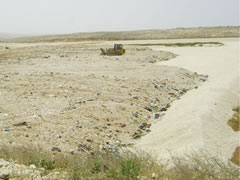
A sanitary disposal site in Hebron, constructed with support from the World Bank. It is nearing its capacity, so expanding the site and constructing a new disposal site is an urgent issue.
These efforts have borne fruit. The organizational structure of JSCs in the West Bank has come together, and they are now able to systematically perform activities. The waste collection service coverage of the five JSCs that were supported as part of the project increased from 44% when the project was started in 2015 to 90% as of 2018. Moreover, with the support of JICA and the LET, the National Strategy for Solid Waste Management (2017-2022) was developed.
There is also a new movement in Palestine. In October 2017, two Palestinian territories, the West Bank and the Gaza Strip, are moving toward administrative unification. Naturally, the Gaza Strip also needs to make improvements to waste management based on a unified policy, such as the aforementioned national strategy. JICA will continue to provide assistance to help create a better future.
A garbage-transporting donkey!?
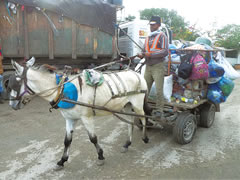
A donkey-drawn cart for transporting garbage. Not enough fuel can be obtained for garbage trucks in the Gaza Strip due to economic sanctions imposed by Israel.
Producing a television program to call attention to waste management!
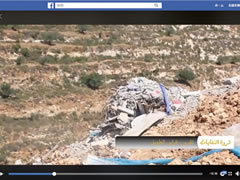
Japan's consultant firm Yachiyo Engineering
produced a local television program as part of the
public awareness campaign for residents. The
significance and workings of waste management
are presented in an easy-to-understand manner,
and as much as 73% of the residents watch it,
including rebroadcasts.
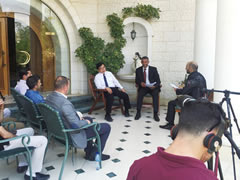
Takaaki Murata, JICA Expert

Murata was assigned to Palestine from November 2016 to January 2017 while he was working at the Global Environment Department of JICA's headquarters. He was dispatched to Palestine as a JICA Expert for the project. He is assisting to improve waste management by cooperating with MoLG, JSCs and local experts.




scroll